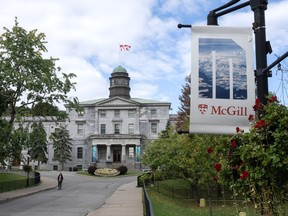The award comes after the Quebec government confirmed its plan to increase tuition for students from the rest of Canada by 33 per cent.

McGill University is launching a new award in an effort to offset the Quebec government’s recent tuition hike for out-of-province students, the school announced Tuesday.
The goal is to bring their tuition fees closer to what they were before the increase, the university said in a statement.
“The award will be guaranteed as an offset on increased tuition for up to four years,” McGill said.
Last week, Quebec Higher Education Minister Pascale Déry announced details of an effort to increase funding for French universities and reduce the number of non-French-speakers in Quebec post-secondary institutions.
The province is hiking tuition for out-of-province students at English-language universities by 33 per cent and imposing new French proficiency requirements for all university students not from Quebec.
Concordia and McGill have said the plan will devastate their finances and enrolment. Bishop’s University, in the Eastern Townships, is being given a partial exemption.
“We are doing everything in our power to ensure that a McGill degree and the Montreal experience is within reach of students from across Canada,” Fabrice Labeau, McGill’s deputy provost of student life and learning, said in the statement about the award.
“Offering this award will require the university to make financial sacrifices, but students from the rest of Canada are part of our DNA,” added McGill president Deep Saini.
The new tuition increase sets the price for out-of-province students at $12,000. The government’s initial plan, announced in October, would have almost doubled the rate to $17,000.
McGill says roughly 80 per cent of new Canadian students from outside Quebec will be eligible for the award, titled the Canada Award.
It will apply to students in arts, agricultural and environmental sciences, music, education, architecture, nursing and “most programs in science.”
The university says more details about the award will be made available on its admissions website by the end of the week.
In addition to the tuition hike, the new French proficiency changes will require 80 per cent of students from outside Quebec studying in the province to reach an intermediate level of French by the time they graduate.
Reacting to the changes when they were made official last week, Saini said McGill had made several “thoughtful and realistic” proposals to the government to try to get it to change course on the increase.
But he felt the university’s efforts went ignored.
“In light of the damage these measures will cause,” Saini said, “I can only view this as a targeted attack on institutions that have been part of Quebec and that have contributed to Quebec for hundreds of years.”